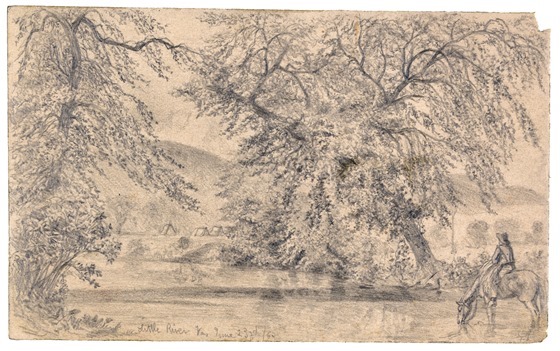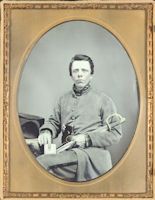June 23.—The State of New-York responded nobly to the call for troops to drive the rebels from the soil of Pennsylvania and Maryland. Twenty regiments at this time had been armed, equipped, and supplied with subsistence and transportation, and had gone to Harrisburgh and Baltimore. Sixteen of these regiments moved from New-York, two from Brooklyn, and two from Buffalo. The following is a list of the regiments that had left: The Seventh, Eleventh, Twelfth, Thirteenth, Twenty-second, Twenty-third, Twenty-eighth, Thirty-seventh, Forty-seventh, Fifty-second, Sixty-ninth, Sixth, Seventy fourth, Seventy-first, Sixty-fifth, Fifty-sixth, Fifth, Thirty-second, Fifty-fifth, Fourth artillery, and a consolidated regiment from Staten Island.
—The Raleigh (N. C.) Standard of this date favored a convention of all the States, to procure peace, either by reconstruction of the Union or by peaceable separation.—Rev. R. I. Graves, of Hillsboro, N. C., who was committed on the fourth of February last, on the charge of treason to the rebel government, was discharged, through the efforts of W. A. Graham.—The London Times publishes an elaborate article against the employment of negroes, as soldiers, in the army of the United States.
—In the Missouri State Convention, Governor Gamble, Chairman of the Committee on Emancipation, presented the following ordinance from the majority of the committee:
First. That the first and second clauses of the Twenty-sixth Section of the Third Article of the Constitution be abrogated.
Second. That slavery, or involuntary servitude, except for the punishment of crime, shall cease to exist in Missouri on the fourth of July, 1876; and that all the slaves within this State on that day be hereby declared free.
Third. That all slaves hereafter brought into the State, not now belonging to citizens of the State, shall thereupon be free.
Fourth. That all slaves, removed by the consent of their owners to any seceded State, after the passage of the ordinance of secession, and hereafter brought into this State by then-owners, shall thereupon be free.
Fifth. The General Assembly shall have no power to pass laws to emancipate slaves without the consent of their owners.
A minority report was also submitted, abrogating some clauses of the Constitution as above, declaring slavery abolished on the first of January, 1864, provided they and their issue be apprenticed to their former owners until the fourth of July, 1876; requiring the Legislature to pass laws regulating the relation between said apprentices and their masters, to secure them humane treatment, necessary education, and providing against importation or emigration of any negro or mulatto in the State. No future assessment of slave property shall be collected, nor shall the right to the services of apprentices be subject to taxation. Provisions were also made to submit the ordinance to a vote of the people.
—Colonel S. H. Saunders returned to Boston, Kentucky, from the expedition sent by General Burnside, into East-Tennessee, and reported as follows:
“I arrived here with my command at eleven o’clock this morning. I struck the railroad at Lenoir, destroyed the road up to Knoxville, made demonstrations against Knoxville, so as to have the troops drawn from above, destroyed the track, and started for Strawberry Plains; burnt Slate Creek Bridge, three hundred and twelve feet long, and the Strawberry Plain Bridge, one thousand six hundred feet long, and also Mossy Creek Bridge, three hundred and twenty-five feet long. I captured three pieces of artillery, some two hundred boxes artillery ammunition, over five hundred prisoners, ten thousand stand of arms, destroyed a large amount of salt, sugar, flour, meal, saltpetre, and one saltpetre works, and other stores. My command is much fatigued. We have had but two nights’ sleep since leaving Williamsburgh. The force in East Tennessee was larger than I had supposed. I did not attack Loudon Bridge, for reasons that I will explain. At Mossy Creek I determined to return. In the mountains I had very great difficulties that were unexpected. I found the gaps, through which I intended to return, strongly guarded with artillery and infantry, and blockaded with fallen timber. A force was also following in our rear. I determined to cross at Smith’s Gap, which I did.”
—Chambersburgh, Pa., was reoccupied by the rebels, under General Rodes; and the National troops, commanded by General Knipe, retreated to the main body.
—The rebel sloop, John Wesley, which had evaded the blockade of St Mark’s, Fla., on the thirteenth, was captured by the Union steamer Circassian.—The Fifth regiment of Massachusetts volunteers, whose term of service had expired, arrived at Fortress Monroe, from Newbern, N. C., and again volunteered their services to General Dix.—The Union gunboat Sumter was sunk off Cape Henry.—Several wagons, with ammunition, forage, and other articles belonging to the National troops, were destroyed by a party from Mosby’s rebel cavalry, on the Chantilly road, near Bull Run, Va.—The sloop Kate, from Nassau, N. P., was captured in Indian River, Fla., by the Union bark, Pursuit.
 Note – This image has been digitally adjusted for one or more of the following:
Note – This image has been digitally adjusted for one or more of the following:









